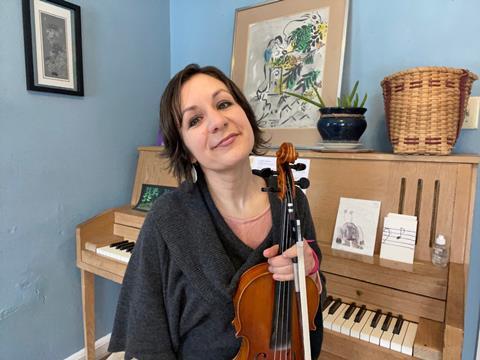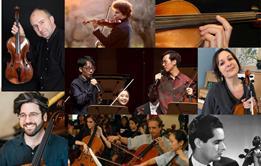Simplicity, curiosity and diligence are the keys to learning by ear, according to violinist Lissa Schneckenburger

Discover more Featured Stories like this in The Strad Playing Hub
I used to think that the things I wasn’t good at were a lost cause, I didn’t even question it. After a particularly disastrous singing performance in high school I thought to myself, ’oh well, I guess I’m not a singer, good thing I love playing the violin!’ It wasn’t until later in college that I began to notice my peers who weren’t good at something originally (take singing for example), working hard and getting noticeably better over time. I began to seriously rethink my ideas about what I was or wasn’t good at, and take on some new challenges.
As a fiddler, I get questions about learning by ear from classical musicians all the time. A lot of folks make the assumption that either you’re born with good ears, or you’re not. Thank goodness that’s not true! Learning music by ear can be an incredible way to improve your aural skills and musicianship. You may assume you’re destined to carry a back-breaking load of sheet music with you to every lesson and performance until the end of time, but I promise you, there is hope for both your ears and your sore back! Learning by ear is just like any other skill even if it doesn’t come naturally to you at first, there are things you can do to practise and get better at it. It’s not magic, it’s simply dedication and hard work.
Before you start, make a commitment to working on ear training daily, in addition to your regular practice time on your instrument. Write your commitment down in a practice journal, and take notes over time as you progress.
Read: 5 simple exercises to use when teaching young children
Read: 5 ways in which learning new violin styles can train your musical ear
Here are five suggestions for how to start out:
1. Practise active (as opposed to passive) listening
Think about the musical qualities- is it fast or slow? How many parts or sections are there? What do you like or dislike about it? Singing along with your favourite music is another way to practise active listening and develop your ear, while helping with long term memory retention.
2. Embrace constructive criticism, let go of negative self talk
When learning something new, it is important to approach the activity with curiosity and an open mind. Notice which tasks are easy or difficult, so you can focus your efforts where you need the most improvement. Get into the habit of being patient with yourself, while still paying attention to how or where you can get better.
3. Simplify the parameters
If you are totally new to learning by ear you might want to start by listening to and thinking about one note at a time rather than large sections. You could practise identifying notes on just one string, or within a certain octave so it is less overwhelming. You might also try learning just the rhythm of a piece, or just the pitches, rather than both at once. Is music easier to learn if you sing it a million times first? The breadth of the parameters will depend on your individual learning style and level.
4. Break everything down into small pieces so that your ears are not overwhelmed
No one starts out by learning all of Vivaldi’s Four Seasons by ear in one sitting; instead try listening for and repeating one note at a time. Try evaluating what you’re hearing and compare two notes in a sequence. Is the second note higher or lower than the first? By a little or a lot? Identifying specific intervals can come later as you advance. Then try finding those one or two notes on your instrument, and work up to more notes in a row gradually over time. Utilise the ’pause’ and ’repeat’ buttons when learning music by ear from a recording, give yourself tiny sections to listen to again and again. Experiment with different learning techniques and write down what you observe. When something works, do it more!
5. Find a guide
Having a practice buddy or teacher to help you improve has many benefits. I love working with students on ear training, but there are many qualified teachers out there who will help you stay motivated.
Fine tuning your ears will allow you to be a more responsive musical partner, and to digest all the music you play more deeply. No matter what level you’re at, the main goal is to fully experience the joy of music, so take it one day at a time and have fun. hEARS to your next musical adventure!
Lissa Schneckenburger is a New England fiddler, singer, and teacher in Brattleboro Vermont. Her Learning By Ear video course is a 14-part series that students can start at any time, available for all instruments and levels at www.lissafiddle.com where people can also sign up for the FREE ’Tune Of The Week’ and group practice challenge.
Topics
Best of 2022: The Strad Playing Hub

Rediscover your favourite online articles from The Strad’s Playing Hub from the past year
- 1
- 2
- 3
- 4
- 5
- 6
 Currently
reading
Currently
reading
How to improve your aural skills and ditch your sheet music in 5 easy steps
- 8
- 9
- 10
- 11
































































No comments yet